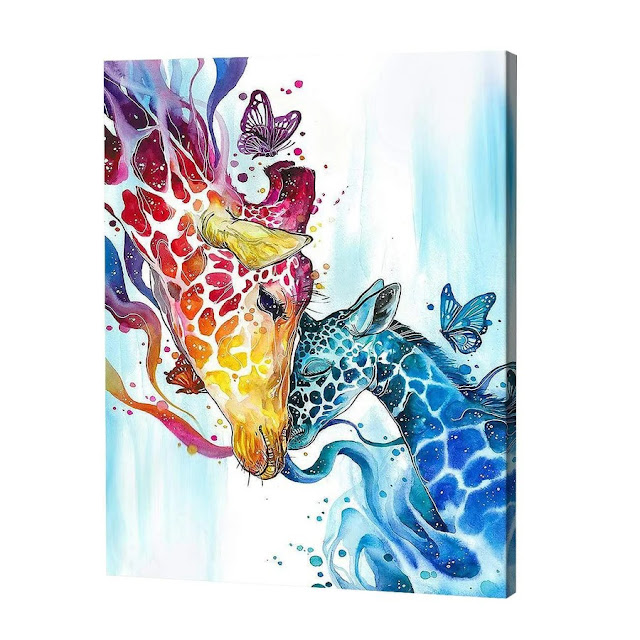Coloring Outside the Lines: What Paint by Numbers Teaches Kids About Art
Art is an essential component of childhood development,
providing a platform for self-expression, creativity, and cognitive growth.
While traditional freeform drawing and painting are valuable, structured
activities like Paint by Numbers also offer unique benefits. Paint
by Numbers for kids not only enhances fine motor skills but also teaches
critical lessons about art and creativity that extend beyond the canvas.
Introduction to Paint by Numbers
Paint by Numbers
is an artistic technique where a picture is divided into shapes, each marked
with a number that corresponds to a particular color. By following these
guidelines, children can create intricate and beautiful artworks, even without
prior painting experience. This method introduces them to art in a structured
manner, yet it leaves room for creativity and personal expression.
The Structured Path to Creativity
1. Foundation in Color Theory
- Understanding
Colors: Paint by Numbers helps children learn about different colors and
how they interact. By matching numbers to colors, they get a hands-on
understanding of primary, secondary, and tertiary colors.
- Blending
Techniques: Although the activity is structured, it encourages children to
experiment with blending colors. This teaches them about gradients, shading,
and the subtle variations that make a painting come to life.
2. Developing Artistic Techniques
- Brush
Handling: Using different brush sizes and strokes helps children develop
control over their painting tools. This foundational skill is crucial for any
aspiring artist.
- Attention to
Detail: The precision required in Paint by Numbers encourages children to
focus on details, enhancing their observational skills and attention to detail.
3. Learning Patience and Perseverance
- Step-by-Step
Progress: Completing a Paint by Numbers project teaches patience. Children
learn to follow steps methodically, understanding that beautiful results take
time and effort.
- Overcoming
Challenges: As they encounter challenging sections, they learn to persist
and problem-solve, building resilience and perseverance.
4. Building Confidence
- Achieving
Success: Completing a Paint by Numbers artwork gives children a sense of
accomplishment. This boosts their confidence and encourages them to tackle more
complex artistic endeavors.
- Pride in
Creation: Displaying their finished paintings allows children to feel proud
of their work, reinforcing their self-esteem and artistic identity.
Encouraging Individual Expression
1. Personalizing the Process
- Creative
Choices: Even within the structured framework, children can make creative
choices. They might decide to deviate from the prescribed colors or add their
own elements to the painting.
- Exploring
Styles: As they grow more confident, children might start blending
different styles or techniques they've learned, making the artwork uniquely
theirs.
2. Freedom within Structure
- Safe
Experimentation: Paint by Numbers provides a safe environment for
experimentation. Children can try new techniques without fear of making
irreversible mistakes, fostering a sense of freedom and creativity.
- Balanced
Guidance: The structure guides them, but the freedom to add personal
touches teaches them that art is about personal expression and interpretation.
3. Breaking Boundaries
- Beyond the
Lines: While the activity starts with staying within the lines, children
gradually learn that art doesn't have to be confined. They begin to understand
that breaking boundaries can lead to unique and expressive artworks.
- Encouraging
Innovation: This balance between structure and freedom encourages
innovation, teaching children that rules can be a starting point, but true
creativity often involves thinking outside the box.
Cognitive and Emotional Growth
1. Enhancing Cognitive Skills
- Problem-Solving:
Figuring out how to complete sections of the painting enhances problem-solving
skills. Children learn to plan and execute their ideas methodically.
- Spatial
Awareness: Understanding how different parts of the painting fit together
improves spatial awareness and cognitive development.
2. Emotional Expression and Regulation
- Expressing
Emotions: Art is a powerful medium for emotional expression. Through Paint
by Numbers, children can express their feelings in a non-verbal way, helping
them process and communicate complex emotions.
- Stress Relief:
The repetitive and focused nature of painting can be calming and therapeutic,
reducing stress and promoting emotional well-being.
Lifelong Love for Art
1. Fostering Appreciation for Art
- Understanding
Artworks: By engaging in Paint by Numbers, children gain a deeper
appreciation for the effort and skill involved in creating art. This fosters a
lifelong appreciation for artistic endeavors.
- Exploring Art
History: Parents and educators can use Paint by Numbers as a gateway to
introduce children to famous artworks and artists, broadening their
understanding and appreciation of art history.
2. Encouraging Future Artistic Pursuits
- Foundation for
Advanced Techniques: The skills learned through Paint by Numbers serve as a
foundation for more advanced artistic techniques. As children grow, they can
build on these skills, exploring various art forms and mediums.
- Nurturing
Creativity: Encouraging creativity from a young age has long-term benefits.
Children who engage in artistic activities are more likely to think creatively
and approach problems with innovative solutions.
Practical Tips for Parents and
Educators
1. Selecting Appropriate Kits
- Choose Paint by
Numbers kits designed for children. These kits typically feature simpler
designs and fewer colors, making them more manageable for young hands.
2. Creating a Supportive Environment
- Set up a
dedicated art space that is comfortable and free from distractions. Provide all
necessary materials and ensure they are easily accessible.
3. Guiding without Overstepping
- Offer guidance
and support, but allow children to make their own creative decisions. Encourage
them to explore and experiment within the structure of the activity.
4. Celebrating Efforts and Achievements
- Celebrate the
completion of each project, regardless of the outcome. Display their artwork
proudly and praise their efforts and creativity.
5. Integrating Art into Daily Life
- Encourage regular
artistic activities. Integrate art into daily routines to make it a consistent
and enjoyable part of their lives.
Conclusion
Paint by Numbers for kids is more than just a fun activity;
it's a valuable educational tool that teaches essential lessons about art and
creativity. By providing a structured yet flexible approach, it helps children
develop fine motor skills, patience, perseverance, and a deep appreciation for
artistic expression. Encouraging children to engage in Paint by Numbers not
only enhances their artistic abilities but also fosters cognitive and emotional
growth, laying the foundation for a lifelong love of art. Through this balance
of structure and freedom, children learn that true creativity often involves
coloring outside the lines.



Comments
Post a Comment